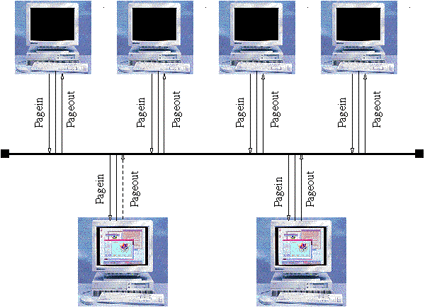

ERCIM News No.26 - July 1996 - FORTH
Using Remote Memory
to Avoid Disk Thrashing
by Evangelos P. Markatos and George Dramitinos
Traditional operating systems use magnetic disks to store filesystems
and memory pages even though the cost of a page transfer between disk and
main memory, measured in processor cycles, continues to increase. Moreover,
applications like multimedia, windowing systems, scientific computations,
engineering simulations, etc, running on workstation clusters (or networks
of PCs) require an ever increasing amount of main memory, usually more than
any single workstation has available. To alleviate the memory shortage problem,
an application could use the virtual memory paging provided by the operating
system, and have some of its data in main memory and the rest on the disk.
Unfortunately, as the disparity between processor and disk speeds becomes
ever increasing, the cost of frequently accessing a magnetic disk becomes
unacceptable. While some workstations are overloaded with memory-starved
applications, other workstations (within the same cluster) stay idle, effectively
wasting their processors and memories. Profiling the unused memory of the
workstations in our lab, we found that the amount of free memory rarely
falls under 50% of the total amount of the cluster's memory. This huge amount
of unused memory could be used as a global cache for the cluster's disk
partitions, both for filesystem caching and for VM page storage, if the
appropriate OS support is provided.
To demonstrate the benefits and ease of use of remote memory, we have designed
and implemented a pager that uses remote memory as backing store. The workstations
that devote part of their memory to store pages of remote applications are
called remote memory servers, while the workstations that use this memory
are called remote memory clients. A workstation may act as a server or as
a client depending on its memory load, as shown in the figure.

Figure:Workstations experiencing high memory load act as clients
while workstations that have enough free memory act as servers.
All server workstations run a remote memory server that handles requests
for pageins, pageouts and informs the clients about the amount of its free
memory. When a client wants to swap out a page it picks the most promising
server. When a server runs out of memory, it informs its clients and stores
some of its least recently used pages on its local disk. In this way, the
servers act as a global LRU cache for the swap partitions of the cluster.
In order to be able to recover from a single server crash, some form of
redundancy must be used, so that lost pages can be reconstructed. We have
implemented a new reliability technique, parity logging, that minimizes
the memory and runtime overhead imposed to paging.
Our performance results are very encouraging. Our test applications show
that using the remote memory for paging results in a twofold improvement
in execution time over an Ethernet interconnection network. Simulating faster
networks we find that even higher performance improvements are realizable.
More information on the project may be found at http://www.ics.forth.gr/proj/arch-vlsi/paging.html.
Please contact:
Evangelos P. Markatos - ICS-FORTH
Tel: +30 81 391655
E-mail: markatos@ics.forth.gr
return to the contents page


